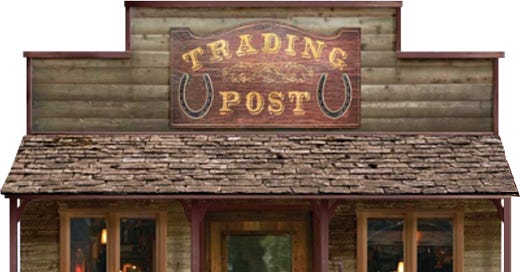Episode #2 - Why all the excitement about the stock market?
Why stocks? Why markets? What's next?
Intro:
Thanks for joining Winnings - 65 of you subscribed already, and if you’re just viewing this - click here to lock in for the rest of these weekly notes. I’m honored to share some useful information regarding what to do with your winnings, and to lay out important general topics in the often mystifying world called “finance.” If you have any specific follow-up questions/comments please email takewinnings@gmail.com.
In the first issue you learned about Traditional/Roth IRA’s. One key takeaway is that to enable your account to grow you need to invest in the stock market with the money in your IRA. You can also invest in the stock market without the tax savings of an IRA in places like Robinhood, Vanguard, Schwab and many others, so the coming information will help you understand both places.
However, as you know I don’t make stock recommendations, I think it’s a good time to slip in some basic information about the stock market so you can better understand what it means to invest in the “stock market.”
History:
If you were asked “What does it mean to own stock in a company?” you’d likely say it means you’re an owner, in part, of that company. For example, if I own shares of Netflix or Amazon, I technically “own” a part of Netflix and Amazon. If they do well, the value of the company goes up and the value of the stock of that company I own goes up too.
If in this conversation they followed up and asked you, but what is the reason anyone would sell a piece of their company to someone else so they would not full benefit from the company’s growth - what would you say?
Here’s what I would say and I think it contextualizes the power of individual stocks, but also prepares you to understand the risk of owning stock too.
In order for a business to operate it needs capital (read: cash) to pay it’s employees, generate new ideas, buy materials, and any other things that it would want to generate cash-flow. Many businesses start off without turning a profit or believe they can achieve more by raising more capital - that is when the public offering (IPO) of stock comes in handy.

Who thought of this idea?
Necessity is the mother of invention, and in the 17th centurya you might recall the Dutch East India Co., they were trying to raise enough capital to embark on long sea expeditions. These expeditions held promise for finding riches abroad - it was anyone’s guess what those riches would be, but the Co. managed to bring together a few business men who pooled their resources and issued the first “paper shares” (Source, Small Business.Chron).
While this is the source of a singular stock as others got on-board with this method of chopping up their companies and selling pieces of it to raise capital “stock markets” or “stock exchanges” emerged. Antwerp, Belgium is credited with having the world's first operational stock market (Source, World Atlas), but stock exchanges emerged in London, Philadelphia, and New York by the close of the 18th century.
Doesn’t everyone want to be an owner? Well, sort of. As you likely can intuit, what if all of the ships of the Dutch East India Co. go bottom up? Or if no one uses Amazon anymore? If you’re an owner, you lose all (or most of) your investment and many people don’t have the stomach for that type of risk.
While this history may make you wary of stocks to the tune of: WHAT IF MY COMPANY GOES BUST? The coming weeks will share some more principles of stocks and how you minimize risk, while still getting the upsides of being an owner.
Takeaway:
Companies were and remain willing to sell parts of their company to generate cash that they can use for expansion and existence. Once many companies offered their companies to the broader world, exchanges emerged as a place to trade different companies.
Interact:
If you don’t follow any markets yet, you can follow the happenings of many modern companies in places like Morning Brew (subscribe here).
Choose a stock or two (i.e. a publicly traded company) and follow it over the next week. If you want me to hold you accountable, email takewinnings@gmail.com and I’ll follow up with you directly. Before you buy anything, it’s good to see what a company looks like on a stock exchange before you go in and buy it.
Gratitude:
Jay H and Evan L kindly pointed out a few errors in the last issue. I’ve updated that note (the chart was the source of most of the errors, but here are the updates that were missed: 1) Trad IRA withdrawals are now required after 72 2) there are no longer age restrictions for Trad IRA contributions, 3) your contributions to IRA’s are not ALWAYS tax deductible, and you can contribute even w/o a tax deduction. 4) the NEW limit for IRA’s is $6,000 not $5,500.



